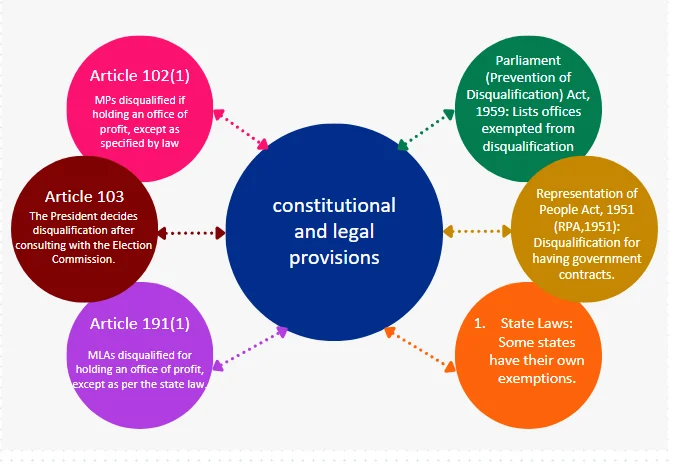The term “Office of Profit” is not explicitly defined in the Constitution or the Representation of People’s Act, 1951, but has been shaped through various court judgments. It refers to positions held by Members of Parliament (MPs) or Members of Legislative Assemblies (MLAs) that may provide financial gain or benefit. Originating from the English Act of Settlement, 1701, the concept ensures that elected officials fulfill their duties without conflicts of interest or undue influence from the executive.
The Office of Profit
Definition and Origin of the Office of Profit
- The Constitution and the Representation of People’s Act 1951 doesn’t clearly define the term.
- The definition has been derived from various court judgements.
- Definition: An “Office of Profit” refers to positions held by Members of Parliament (MPs) or Members of the Legislative Assembly (MLAs) that may provide financial gain or benefit.
- Origin and Development: The concept comes from the English Act of Settlement, 1701, and its definition has evolved through court judgments.

Enroll now for UPSC Online Course
Significance of ‘Office of Profit’ Disqualification
Upholding Constitutional Responsibility: Ensures MPs/MLAs fulfil their duties.
- Preserving Separation of Powers: Prevents undue influence by the executive over the legislature.
- Maintaining Checks and Balances: Safeguards democratic principles and prevents any branch of government from overstepping.
- Preventing Conflicts of Interest: Ensures elected members can perform their duties independently without external pressures.
Key Tests to Determine Office of Profit
- Appointment Test (1964): The Supreme Court in Ram Chandra Kesari v. Union of India established the “appointment test” to determine whether an office constitutes an office of profit.
- This test focuses on the nature of the office itself, not the person holding it.
- If the office is created by an appointment, it is considered an office of profit.
- Remuneration Test (1964): The Court in Ram Chandra Kesari v. Union of India further clarified that an office of profit must carry some remuneration, whether fixed or variable.
- If the office does not provide any financial benefit to the holder, it is not an office of profit.
- Independent Office Test (1970): The Court in Kultar Chand Rana v. Union of India introduced the “independent office test” to distinguish between offices under the government and those merely incidental to it.
- An office must be independent of the holder’s position as a member of Parliament or a state legislature to be considered an office of profit.
- Potential Effect test (2006): The Court in Jaya Bachhan case also held that the “potential effect test” should be applied to determine whether an office constitutes an office of profit.
- This test focuses on the potential for the office to influence the holder’s performance of his or her duties as a member of Parliament.
- Declaration by Legislature (2014): The Court in UC Raman case acknowledged the power of Parliament and state legislatures to declare certain offices not to be offices of profit.
- This provision allows for flexibility in determining which offices should disqualify a member of Parliament or a state legislature.
Recommendations Of 2nd ARC For Addressing Issues Related To The Office Of Profit
- Define it through the RPA,1951, considering factors like remuneration and powers, and empowering the Election Commission to make determinations.
- It also recommended that all offices with executive decision-making powers and financial control be treated as an office of profit.
Ncrwc Made Several Recommendations Regarding The Office Of Profit, Including
- Redefining the Concept of Office of Profit: The NCRWC recommended that the definition of office of profit be narrowed to focus on offices that provide significant financial benefits or have a direct connection to the government.
- This would help to avoid disqualifying members of Parliament or State Legislatures for holding positions that do not pose a threat to their independence.
- Clarifying the Test for Determining Office of Profit: The NCRWC recommended that the Supreme Court’s “potential effect test” be replaced with a more objective test.
- This new test would focus on the actual benefits and powers of the office, rather than on the potential for the office to influence the holder’s performance as a lawmaker.
- Exempting Certain Offices from Disqualification: The NCRWC recommended that certain offices be exempted from the office of profit disqualification, such as offices held by ministers, parliamentary secretaries, and members of committees.
- Providing a Mechanism for Review of Office of Profit Cases: The NCRWC recommended that a mechanism be established for reviewing office of profit cases.
- This mechanism could be a panel of retired judges or a special tribunal.
- The NCRWC’s recommendations on the office of profit have been praised by some for providing a more balanced and practical approach to this issue.
- However, others have criticized the recommendations, arguing that they would weaken the office of profit doctrine and make it easier for members of Parliament or state legislatures to hold positions that conflict with their duties as lawmakers.
Enroll now for UPSC Online Course
| Must Read | |
| Current Affairs | Editorial Analysis |
| Upsc Notes | Upsc Blogs |
| NCERT Notes | Free Main Answer Writing |
Conclusion
Addressing the complexities of the “Office of Profit” is essential for maintaining the integrity of India’s democratic system.
- By defining it clearly through legislation, considering factors like remuneration and powers, and implementing mechanisms for review, we can uphold the principle of separation of powers and prevent conflicts of interest.
- Such reforms, as recommended by the 2nd ARC and NCRWC, would strengthen the accountability and independence of our elected representatives.
Sign up for the PWOnlyIAS Online Course by Physics Wallah and start your journey to IAS success today!
| Related Articles | |
| State Legislature in India | Supreme Court of India |
| Election Commission of India | Member of Parliament |

 GS Foundation
GS Foundation Optional Course
Optional Course Combo Courses
Combo Courses Degree Program
Degree Program









